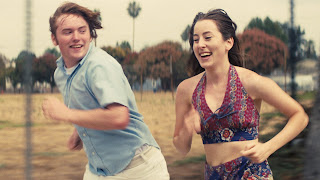Love Blind | "Pink Grapefruit"
A sensuous thriller finds two strangers set up on a romantic getaway. Things do not go as planned.
Sundance Official Selection 2015 | Directed by Michael Mohan | 10:46.
Convinced she is a master of self-sabotage when it comes to love, our protagonist reluctantly agrees to let her married friends host a blind date at a private and lavish mansion in the desert. While the characters remain unnamed in this elegantly minimalist film, the camera closely follows the experience of intimacy and draws on character foils to explore physical and emotional vulnerability. As an inherently voyeuristic medium, how can film create intimacy? And what role can story play in solving individual and universal fears?
The cinematography, restrained primarily to a static tripod, adds suspense with long zoom-ins for moments of nervousness and gestures of warmth. When the protagonist anxiously answers the door to meet her date, the camera embodies her experience of distraction with abrupt handheld movements–enacting the lost train of thought as she drinks in the charming details of his pants, glasses, lips and hair. Alternating between these modes of movement and states of mind, the film generates its own form of intimacy.
At first, the married couple’s overt PDA in the pool appears to be the goal in mind, and contrasts the idle date as the two look on at the water’s edge in awkwardness. The shy strangers soon separate for their own beds, undressing in silhouettes. In the morning while gathering grapefruit they reach a turning point, when the young lady confronts her fear and states clearly the intention to at least get to know one another. They make grapefruit juice and, as their foil, the married couple finish making their own drinks after having raunchy (though sparkless) sex. Soon at the pool, the new friends stare into each other’s eyes through the camera and tenderly agree to try sex that night. A blissful connection follows while the married couple undress in silhouettes. Throughout the stay the married couple has been closely tracking the progress of the date, with a camera inhabiting their POV looking on and listening in on conversations omnisciently. As a storytelling device the married couple serve as guides for both the protagonist and viewer, bringing into question the ingredients of love.
After a successfully fun night, the young couple depart so fast as to leave the married couple surprised, yet pleasantly comforted by their matchmaking skills. With a wry wink to the audience, the film self-reflects with a closing scene of the desert.



Comments
Post a Comment